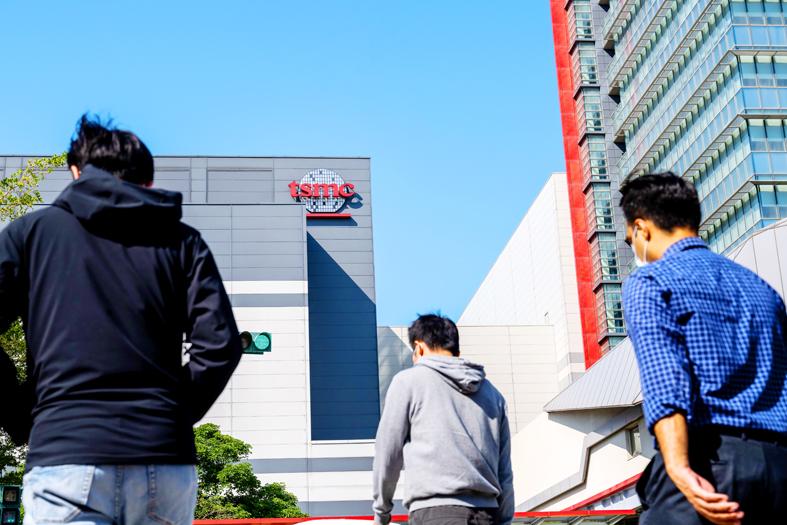The world’s top 10 foundries, led by Taiwan Semiconductor Manufacturing Co (TSMC, 台積電), are expected to see accelerated revenue growth this quarter, as a persistent chip crunch drives prices even higher, market researcher TrendForce Corp (集邦科技) forecast yesterday.
The Taipei-based researcher expects the top 10 foundries’ sequential revenue growth this quarter would outpace the 6.2 percent growth they posted last quarter.
“A shortage of foundry capacity, which began in the second half of 2019, has persisted and even intensified for nearly two years,” TrendForce said in a note, adding that some foundries have expanded capacity, but it was not enough to alleviate the shortage.

Photo: Bloomberg
Moreover, as the world’s major foundries last quarter began boosting auto chip production, it has squeezed capacity allocation for chips used in other applications, TrendForce said.
That has compounded the shortage and led to a new wave of price increases, it said.
Last quarter, the top 10 foundries made US$24.41 billion in aggregate revenue, posting a record high for an eighth consecutive quarter.
TSMC’s revenue increased 3.1 percent quarter-on-quarter to US$13.3 billion last quarter, which gave it a market share of 52.9 percent, TrendForce said.
TSMC’s revenue growth lagged behind the other foundries in the top 10 list because of its stable pricing strategy and capacity losses after a power outage at its Fab14 P7 in the Southern Taiwan Science Park (南部科學園區) in April and a brief production disruption when the Hsinta Power Plant (興達電廠) in Kaohsiung temporarily went offline in May.
Samsung Electronics Co ranked the second-biggest foundry in the world with a market share of 17.3 percent.
The South Korean company’s revenue expanded 5.5 percent quarterly to US$4.33 billion after its fab in Texas resumed full production in April after a winter storm in February brought its production to a halt.
United Microelectronics Corp (聯電) ranked third with a market share of 7.2 percent.
The Taiwanese company’s revenue climbed 8.5 percent quarterly to US$1.82 billion last quarter, benefiting from strong customer demand for power management ICs, Wi-Fi and driver ICs used in OLED products, as well as a 5 percent price hike, TrendForce said.

Taiwan Semiconductor Manufacturing Co (TSMC, 台積電) yesterday said that its investment plan in Arizona is going according to schedule, following a local media report claiming that the company is planning to break ground on its third wafer fab in the US in June. In a statement, TSMC said it does not comment on market speculation, but that its investments in Arizona are proceeding well. TSMC is investing more than US$65 billion in Arizona to build three advanced wafer fabs. The first one has started production using the 4-nanometer (nm) process, while the second one would start mass production using the

A TAIWAN DEAL: TSMC is in early talks to fully operate Intel’s US semiconductor factories in a deal first raised by Trump officials, but Intel’s interest is uncertain Broadcom Inc has had informal talks with its advisers about making a bid for Intel Corp’s chip-design and marketing business, the Wall Street Journal reported, citing people familiar with the matter. Nothing has been submitted to Intel and Broadcom could decide not to pursue a deal, according to the Journal. Bloomberg News earlier reported that Taiwan Semiconductor Manufacturing Co (TSMC, 台積電) is in early talks for a controlling stake in Intel’s factories at the request of officials at US President Donald Trump’s administration, as the president looks to boost US manufacturing and maintain the country’s leadership in critical technologies. Trump officials raised the

‘SILVER LINING’: Although the news caused TSMC to fall on the local market, an analyst said that as tariffs are not set to go into effect until April, there is still time for negotiations US President Donald Trump on Tuesday said that he would likely impose tariffs on semiconductor, automobile and pharmaceutical imports of about 25 percent, with an announcement coming as soon as April 2 in a move that would represent a dramatic widening of the US leader’s trade war. “I probably will tell you that on April 2, but it’ll be in the neighborhood of 25 percent,” Trump told reporters at his Mar-a-Lago club when asked about his plan for auto tariffs. Asked about similar levies on pharmaceutical drugs and semiconductors, the president said that “it’ll be 25 percent and higher, and it’ll

CHIP BOOM: Revenue for the semiconductor industry is set to reach US$1 trillion by 2032, opening up opportunities for the chip pacakging and testing company, it said ASE Technology Holding Co (日月光投控), the world’s largest provider of outsourced semiconductor assembly and test (OSAT) services, yesterday launched a new advanced manufacturing facility in Penang, Malaysia, aiming to meet growing demand for emerging technologies such as generative artificial intelligence (AI) applications. The US$300 million facility is a critical step in expanding ASE’s global footprint, offering an alternative for customers from the US, Europe, Japan, South Korea and China to assemble and test chips outside of Taiwan amid efforts to diversify supply chains. The plant, the company’s fifth in Malaysia, is part of a strategic expansion plan that would more than triple